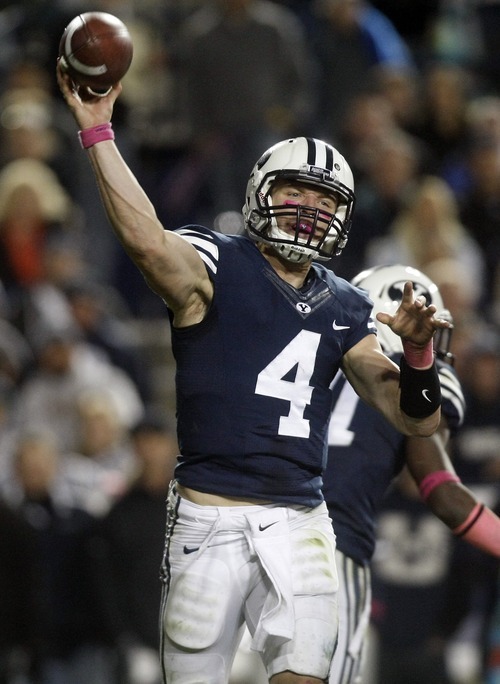This is an archived article that was published on sltrib.com in 2012, and information in the article may be outdated. It is provided only for personal research purposes and may not be reprinted.
Could Major League Baseball's new $12.4 billion TV contracts result in BYU joining the Big East in football?
It sounds sort of crazy, but the answer is — maybe. Because there could be a domino effect involving TV networks, baseball and football.
Despite declining TV ratings, MLB extended deals with Fox and Turner that more than double its take to an average of $845 million per year. Add the $700 million per year (up from $360 million) it will get from ESPN, and MLB will rake in $12.4 billion total from 2014-2021.
How does this, in any way, relate to the Big East?
Since Comcast took over NBC last year, it has been pushing to get back into sports in a big way. Not just on the broadcast network, but on the NBC Sports Network, which it would like to transform into a rival to ESPN.
The hard part is obtaining programming. Something more than the NHL and MLS. Something besides baseball, which NBC struck out on.
At the moment, there aren't a lot of sports properties in play. That includes the ACC, SEC, Big Ten, Big 12 and Pac-12, which are all in the midst of long-term contracts.
The Big East, on the other hand, is in the midst of an exclusive negotiations period with ESPN.
Maybe ESPN pays big bucks to keep another property out of NBC's hands. That might simplify some sort of agreement between BYU — in Year 2 of an eight-year deal with ESPN — and the Big East.
If ESPN and the Big East don't reach a deal in the next couple of weeks, the league is free to deal with any network. NBCSN is reportedly very interested, and there may be other options.
Fox hasn't ruled out turning its Speed channel into an all-sports cable network, which would compete for programming and drive rights fees even higher.
The Big East is trying to sell itself as a four-time zone conference that's an attractive TV property. Heck, it hired former CBS Sports executive Mike Aresco as its new commissioner to secure a deal that it hopes will pay more than the $17.1 million per team the ACC is getting annually.
Yes, it sounds sort of crazy to think that the depleted Big East could get more than the ACC — but networks are desperate for programming.
Remember, baseball ratings went down but its rights fees are going up. A lot.
Would a big contract for the Big East tempt BYU? Guaranteed national exposure? A chance to play teams across the nation? Maybe.
BYU still isn't commenting on conference membership. And the folks in Provo have made it clear their independence isn't just about money.
But stranger things have happened. Like Notre Dame agreeing to play five games per year against ACC teams.
If Notre Dame, which has been independent forever, has to do that, can BYU go it alone? Or could the Cougars work out something along the lines of what the Irish announced?
"I think the Big East ought to cut a deal with them," said ESPN analyst Rod Gilmore. "The Big East needs something. [BYU] is a great name-brand if they can get them. And to have a ready schedule of four or five teams and then build around that would be pretty good for BYU."
And, with more networks hungry for limited programming, the Big East just might be able to a come up with a contract that will include the cash and the exposure to make it worth BYU's while.
Scott D. Pierce covers television for The Salt Lake Tribune. Email him at spierce@sltrib.com; follow him on Twitter @ScottDPierce.





